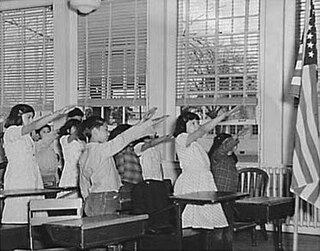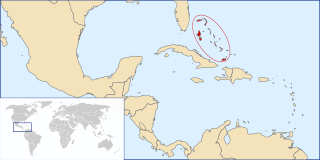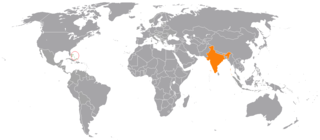This article needs additional citations for verification .(September 2020) |
The Pledge of Allegiance is the national pledge of The Commonwealth of the Bahamas which was written by Rev. Philip Rahming.
This article needs additional citations for verification .(September 2020) |
The Pledge of Allegiance is the national pledge of The Commonwealth of the Bahamas which was written by Rev. Philip Rahming.
I Pledge my allegiance to the flag and to the Commonwealth of The Bahamas
For which it stands, one people united in love and service. [1]

The Bahamas, officially the Commonwealth of The Bahamas, is an island country within the Lucayan Archipelago of the Atlantic Ocean. It contains 97% of the Lucayan Archipelago's land area and 88% of its population. The archipelagic country consists of more than 3,000 islands, cays, and islets in the Atlantic Ocean, and is located north of Cuba and northwest of the island of Hispaniola and the Turks and Caicos Islands, southeast of the U.S. state of Florida and east of the Florida Keys. The capital is Nassau on the island of New Providence. The Royal Bahamas Defence Force describes the Bahamas' territory as encompassing 470,000 km2 (180,000 sq mi) of ocean space.
A commonwealth is a traditional English term for a political community founded for the common good. The noun "commonwealth", meaning "public welfare, general good or advantage", dates from the 15th century. Originally a phrase, it comes from the old meaning of "wealth", which is "well-being", and was deemed analogous to the Latin res publica. The term literally meant "common well-being". In the 17th century, the definition of "commonwealth" expanded from its original sense of "public welfare" or "commonweal" to mean "a state in which the supreme power is vested in the people; a republic or democratic state".

The Pledge of Allegiance is a patriotic recited verse that promises allegiance to the flag of the United States and the republic of the United States of America. The first version was written in 1885 by Captain George Thatcher Balch, a Union Army officer in the Civil War who later authored a book on how to teach patriotism to children in public schools. In 1892, Francis Bellamy revised Balch's verse as part of a magazine promotion surrounding the World's Columbian Exposition, which celebrated the 400th anniversary of Christopher Columbus' arrival in the Americas. Bellamy, the circulation manager for The Youth's Companion magazine, helped persuade then-president Benjamin Harrison to institute Columbus Day as a national holiday and lobbied Congress for a national school celebration of the day. The magazine sent leaflets containing part of Bellamy's Pledge of Allegiance to schools across the country and on October 21, 1892, over 10,000 children recited the verse together.

Francis Julius Bellamy was an American Christian socialist Baptist minister and author. He is best known for writing the original version of the Pledge of Allegiance in 1892.
"March On, Bahamaland" is the national anthem of The Bahamas. Timothy Gibson composed the music and authored the lyrics. It was adopted as the national anthem in 1973, when the country gained independence from the United Kingdom.

An oath of allegiance is an oath whereby a subject or citizen acknowledges a duty of allegiance and swears loyalty to a monarch or a country. In modern republics, oaths are sworn to the country in general, or to the country's constitution. For example, officials in the United States, take an oath of office that includes swearing allegiance to the United States Constitution. However, typically in a constitutional monarchy, such as in the United Kingdom, Australia, and other Commonwealth realms, oaths are sworn to the monarch. Armed forces typically require a military oath.

The Bellamy salute is a palm-out salute created by James B. Upham as the gesture that was to accompany the Pledge of Allegiance of the United States of America, whose text had been written by Francis Bellamy. It was also known as the "flag salute" during the period when it was used with the Pledge of Allegiance. Bellamy promoted the salute and it came to be associated with his name. Both the Pledge and its salute originated in 1892. Later, during the 1920s and 1930s, Italian fascists and Nazi Germans adopted a salute which was very similar, attributed to the Roman salute, a gesture that was popularly believed to have been used in ancient Rome. This resulted in controversy over the use of the Bellamy salute in the United States. It was officially replaced by the hand-over-heart salute when Congress amended the Flag Code on December 22, 1942.

The flag of the Commonwealth of Kentucky was adopted on March 26, 1918. In June 1962, it was slightly redesigned.

The governor-general of The Bahamas is the representative of the Bahamian monarch, currently King Charles III, in the Commonwealth of The Bahamas. The governor-general is appointed by the monarch on the recommendation of the prime minister of The Bahamas. The functions of the governor-general include appointing ministers, judges, and ambassadors; giving royal assent to legislation passed by parliament; issuing writs for election.

The Parliament of The Bahamas is the bicameral national parliament of the Commonwealth of The Bahamas. The parliament is formally made up of the sovereign, an appointed Senate, and an elected House of Assembly. It currently sits at the Bahamian Parliament Building in Nassau, the national capital.
In Australia, an Oath of Allegiance or an Affirmation of Allegiance are oaths of allegiance required to be made to the monarch of Australia in some situations. Oaths of Allegiance are usually made on a Bible, or some other book holy to the person, such as a Torah or Quran; but the person may opt to make an affirmation in lieu of an oath. This oath is not the same as the Australian Citizenship Pledge which is required to be made when being naturalised as an Australian citizen.

The monarchy of the Bahamas is a system of government in which a hereditary monarch is the sovereign and head of state of the Commonwealth of The Bahamas. The current Bahamian monarch and head of state, since 8 September 2022, is King Charles III. As sovereign, he is the personal embodiment of the Bahamian Crown. Although the person of the sovereign is equally shared with 14 other independent countries within the Commonwealth of Nations, each country's monarchy is separate and legally distinct. As a result, the current monarch is officially titled King of the Bahamas and, in this capacity, he and other members of the royal family undertake public and private functions domestically and abroad as representatives of the Bahamian state. However, the King is the only member of the Royal Family with any constitutional role.

The Bahamas has a strong bilateral relationship with the United Kingdom, represented by a High Commissioner in London. The Bahamas also associates closely with other nations of the Caribbean Community (CARICOM).

The following is an alphabetical list of topics related to the Commonwealth of The Bahamas.
The Pledge of Allegiance of the United States is an expression of allegiance to the flag of the United States and the republic of the United States of America. The Pledge of Allegiance Building, or Youth's Companion Building, in Boston, Massachusetts, U.S. was where the pledge was written.
The Battle of Krosno on December 7, 1655. Polish-Lithuanian Commonwealth forces under the command of Gabriel Wojniłłowicz defeated the Swedish forces, supported by their Polish allies under Colonel Aleksander Pracki. The battle was regarded as a symbol of Polish resistance to the Swedes, as it was first Polish victory since the Swedish invasion in the Summer of 1655.

A constitutional referendum was held in the Bahamas on 7 June 2016. Voters were asked whether they approve of four separate constitutional amendments. All four proposals were rejected.

Bahamas–India relations refer to bilateral relations between The Bahamas and India. The Bahamas maintains an Honorary Consulate in New Delhi. The High Commission of India in Kingston, Jamaica concurrently accredited to The Bahamas. India does not have a resident diplomatic mission in The Bahamas.
"God Bless our Sunny Clime" is the national song of The Commonwealth of the Bahamas. Its music was composed by Timothy Gibson and E. Clement Bethel. The lyrics were written by the Rev. Philip Rahming, a Baptist minister and lecturer at the College of the Bahamas.
Bahamian nationality law is regulated by the 1973 Constitution of the Commonwealth of The Bahamas, as amended; The Bahamas Nationality Act; The Bahamas Immigration Act; and various British Nationality laws. These laws determine who is, or is eligible to be, a national of The Bahamas. Bahamian nationality is typically obtained either on the principle of jus soli, i.e. by birth in The Bahamas; or under the rules of jus sanguinis, i.e. by birth abroad to a father with Bahamian nationality. It can also be granted to persons with an affiliation to the country, or to a permanent resident who has lived in the country for a given period of time through naturalisation. There is currently no program in The Bahamas for citizenship by investment. Nationality establishes one's international identity as a member of a sovereign nation. Though it is not synonymous with citizenship, rights granted under domestic law for domestic purposes, the United Kingdom, and thus the commonwealth, has traditionally used the words interchangeably.